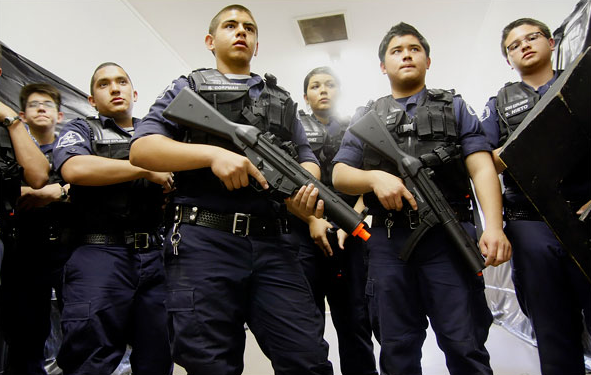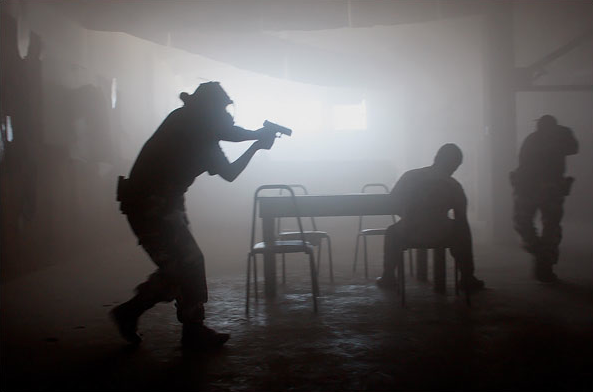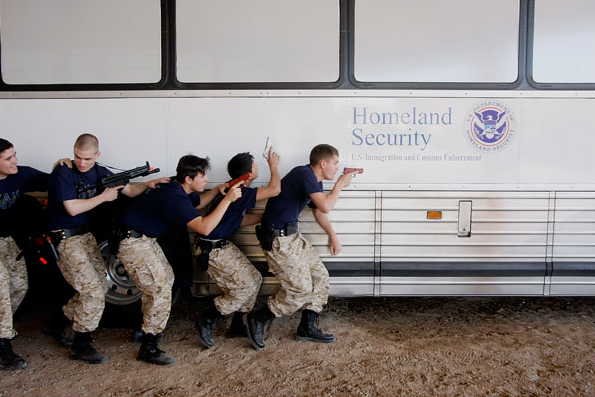The scene above has a familiar aura about it: It could be a photograph of a drug bust somewhere in Mexico or Colombia, or it could be a rescue scene from an episode of a TV show like 24 or The Unit. But it is none of these things. Rather, it is a photograph of a group of Explorers in California “portraying Border Patrol agents rushing into a room filled with fake poison gas” and “aiming their weapons at a man before realizing he was a wounded hostage.”
Explorers is a coeducational affiliate of the Boy Scouts of America that is currently run under the auspices of a program called “Learning for Life.” According to the Learning for Life website, the primary goal of the program is “career exploration … designed to help young people make intelligent decisions regarding their future.” Explorer posts in the U.S. boast over 145,000 youth members, 35,000 of whom participate in the specific program dedicated to careers in “law enforcement,” which, among other things, works to train youth (age 14-21) in how to “to confront terrorism, illegal immigration and escalating border violence.” In short, it is something of a paramilitary version of the Jr. ROTC programs that populate many of our high schools and which functionally reduce citizenship and patriotism to the model of military life—a rigidly hierarchical world in which independent thinking is not only frowned upon, but severely disciplined. Military and paramilitary organizations are vital and necessary arms of government, to be sure, and we would be poorer as a nation without their presence or the many dedicated individuals who serve in them. That said, one has to wonder if such militaristic “Learning for Life” programs offer the most effective model for animating critical thinking and a productive civic life amongst our most impressionable citizens.
But there is an something more to be said. We have written regularly here at NCN about what we call the “normalization of war,” a collection of cultural practices which naturalize and reinforce a war culture that in turn animates a pernicious cycle of violence (e.g., here, here, and here). I was reminded of this process of normalization by the picture above, which was embedded in a NYT slide show that included a number of photographs of Explorers “playing at” hunting down suicide bombers, hijackers, snipers, and illegal immigrants with toy guns Setting aside the fact that the vast majority of “illegal immigrants” are otherwise law abiding citizens—and in any case, certainly not terrorists—the larger point to make is that collectively the photographs teeter back and forth between an implicit and certain playfulness and dead seriousness.

This ironic tension is a palpable reminder of the fine line between the attitudes of play and serious business, and how the former can seem innocent (and in some contexts even ambiguously endearing, as in this image that recently appeared in the Washington Post and was the topic of discussion over at the Bag), even as it coaches (and too easily converts into) more solemn and severe behaviors. Notice how the same toy guns that seem harmless in the top photograph appear threateningly dangerous in the bottom image. Put differently, these photographs visualize the very logic that underwrites the production of a war culture: making warlike behavior seem harmless—and indeed fun—even as it gestures toward a putative, if not ominously mistaken, larger purpose. Learning for life, indeed.
Photo Credits: Todd Krainin/NYT Crossposted at The Bag.


This recalls for me visiting with the father of one of my friends in Germany in about 1981. Discussing his childhood, he spoke fondly of his involvement with the Hitler Jugend. He seemed put off that the group had such negative historical connotations. It had all been good, healthy fun, camping and hiking and such. Like the Boy Scouts.
yeah.. cool!!
[…] Launches Anti-Terror Operation [NYT] // Russian Subs Patrolling Off East Coast of U.S. [NYT] // Learning For Life [NO CAPTION NEEDED] // New Desert City [Archinect] // Russia-China war games battle extremists, separatists [CSM] // […]
Way cool 🙂
__________________
Paintball Gun